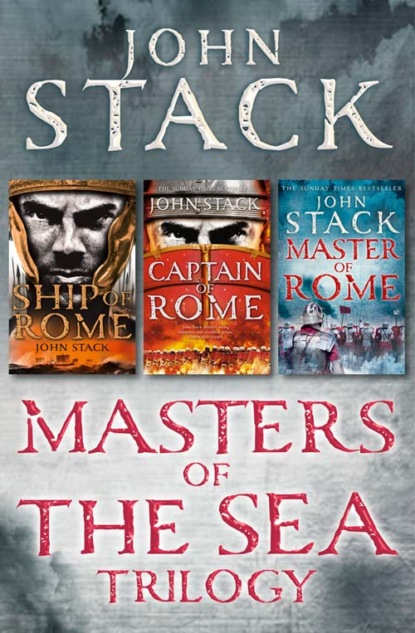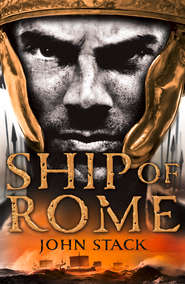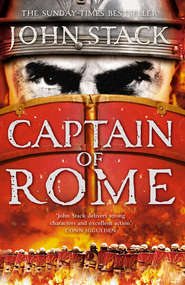По всем вопросам обращайтесь на: info@litportal.ru
(©) 2003-2025.
✖
Masters of the Sea Trilogy: Ship of Rome, Captain of Rome, Master of Rome
Автор
Год написания книги
2019
Настройки чтения
Размер шрифта
Высота строк
Поля
Eighty yards.
Melus could clearly hear the unchecked drum beat of ramming speed, the sound unnerving, shattering the confidence of his earlier conviction.
Sixty yards.
A sudden urge to turn and run tore through Melus and he closed his eyes to suppress it, clinging to the belief that there was still a chance the Carthaginian would flinch.
Forty yards.
Melus opened his eyes. The prow of the Carthaginian galley filled his vision, its insistent course unerring. His breath froze in his throat as his nerve collapsed, his wits fleeing before the sight in his mind of the destruction of the Onus and her crew, a fate that could not be endured, a fate that could yet be avoided if he turned …
Melus threw his whole weight behind the tiller, heeling the Onus hard over to port. With the wind dead astern, the barge reacted instantly, her bow swinging quickly across the course of the approaching galley. The captain braced himself against the tiller, willing his ship to respond faster. His eyes remained locked on the Carthaginian galley, on the six-foot bronze ram screaming towards them at wave height, praying she would remain on her original course, the sight of so many other targets too great a temptation.
The voice in his head roared in rage and fear, ‘Take them, not me. Kill them but spare me—’
His silent cries were cut short by the sight of the ram swinging around to centre itself on the exposed hull of the Onus.
Gisco cursed as the Roman barge broke off her line to a head-on collision. He was standing firm on the aft-deck of the Melqart, his whole body tensed in anticipation, his mind locked on the thought of the bronze ram sinking deep into the bow of the transport barge, a near-suicidal blow that would rock both ships to their cores. He took precious seconds to react to the unexpected reprieve before his mind roared at him to take action.
‘Hard to starboard! Ram amidships!’
The Melqart swung immediately onto its final course, the oncoming wind-driven waves breaking over the ram.
The quinquereme struck the transport barge at a speed of thirteen knots, the six-inch squared blunt nose of the bronze ram splintering the oaken hull of the barge, the momentum of the ninety-ton galley driving the point deeply into the bowels of the larger ship. The force of the impact was absorbed by the keel of the galley, but the sudden loss of speed caused the rowers to lose all coordination and the Melqart came to a complete stop.
‘Archers!’ Gisco roared, and immediately ignited, resin-soaked arrows flew from the main deck of the galley to target the enormous mainsail of the stricken barge. For a second nothing happened, the arrows seemingly ineffective, then small flames appeared as if from nowhere on the huge canvas of sail. The flames held and then exploded as they began to consume the sail.
‘Withdraw!’
The orders to the slave deck were concise and well practised and the Melqart slowly reversed, her ram withdrawing from the mortally wounded ship, the water rushing past it into the gaping hole below the waterline.
‘Cut her down! … For the love of Fortuna cut her down before it spreads!’ Melus roared as he watched the fire grow from the corner of the great sail. Within seconds it began to engulf the entire canvas, the flames licking and then igniting the running rigging and mainmast. The crew of the Onus had been drilled many times in the training that now controlled their actions, their fear of fire fuelling their haste, their bare feet running along the timber deck that the fire above them so desperately craved.
The fire continued to consume the sail, its appetite fed by the trailing wind and, even as Melus watched, the first fiery sections began to fall to the deck. The men attacked the fallen canvas with fanatic hostility, beating the flames with water-soaked cloths. One man screamed as a burning section of canvas fell on him, igniting his hair and clothes, and he ran aimlessly across the deck before falling over the side rail.
The deck heeled violently as the Carthaginian galley withdrew her ram and many men fell on the inclined main deck. The entire sail was now aflame and the falling burning pieces overwhelmed the futile efforts of the crew. Melus looked past the burning main deck to the Carthaginian galley. She was resuming her course to the remaining transport barges behind the Onus, her crew cheering at the sight of the sinking Roman ship.
Melus held on to the tiller tightly as the deck continued to heel over under his feet, the Onus sinking rapidly by the bow. Bitter tears ran freely down his face as shame consumed him, shame for his cowardice, of calling down damnation on his fellow sailors in a bid to save his own life. A rage of frustration and regret overwhelmed him, for he knew he should have stayed on his collision course. The result would have been the complete destruction of the Onus, but Melus now realized their fate had been sealed the moment they sailed from Brolium only hours before. By turning his ship he had lost his only chance to exact some revenge from the Carthaginians for the destruction of his ship and crew, his only chance to send some of the enemy ahead of him to Hades.
The Melqart increased to attack speed as the helmsman sought out another target. Gisco looked around him at the carnage wrought by his fleet of twenty galleys. Some of his galleys were chasing barges as they attempted to break from the pack and escape, while others had sailed directly into the centre of the transport fleet, causing panic and collisions as they snapped at the heels of the larger vessels.
Gisco saw a knot of men in the sea ahead: Romans who had jumped from a burning vessel. They were keeping together, helping each other as their ship slipped beneath the waves not twenty feet away.
‘Helm, one point to starboard!’ Gisco ordered, the helmsman immediately seeing the intended target. He lined up the Melqart perfectly.
The ninety-ton galley bore down on the knot of men, one of their number suddenly seeing the approaching galley, his cries alerting the others. Hamilcar watched the enfolding scene without comment, despising the brutality of targeting helpless men in the water. Like all on board he had cheered as the Melqart had made her first kill, revelling in the destruction of the enemy fleet, praising Tanit, the Phoenician goddess of fortune, for the incredible stroke of fate that had delivered the Roman fleet into their hands.
The frantic pleas of the Romans were cut off as the Melqart struck, many of the archers on the aft-deck running to the stern rail, hoping for survivors. There were none. Hamilcar found himself watching Gisco as the admiral stared at the broken bodies of the Romans in the wake of his ship. He marvelled at the duality of the commander. He was an incredible seaman, the perfection of his trap and his ability to understand and outwit the Roman enemy testament to his skill. But he was also capable of incredible brutality, a burning, insatiable blood lust that demanded a heavy price from the enemy.
Hamilcar recalled the brief of his appointment, a shadow to extend the reach of the Council of Carthage to ensure there was no repeat of Gisco’s ignominious defeat at Agrigentum. It was a course that Hamilcar had often secretly questioned, wondering why Gisco had been allowed to retain his command. Only now, in the heat of battle, did he fully understand the Council’s logic. If Rome was to be defeated in Sicily, men with Gisco’s ruthlessness would be needed in every battle. In all its five-hundred-year history, Carthage had never relinquished a dominion to any enemy. Sicily could not become an exception.
Gisco turned as the Roman sailors slipped beneath the waves, immediately noticing Hamilcar’s gaze. The younger man continued to stare, a new commitment to forge a unified command welling up within him. Gisco noted the expression and mistook it for a shared satisfaction over the death of the helpless Roman sailors.
‘This will send a message to Rome and her legions,’ Gisco said, the fire of victory in his words. ‘From this moment, from this day, the seas belong to Carthage.’
Hamilcar nodded, bridging the gulf of honour between them with the common belief in their cause.
‘We have become messengers of Mot, the god of death. His message is: Death to the Romans.’
Hamilcar’s expression remained hard as he absorbed the words, the finality and the determination of the battle-hardened man before him. Gisco fought out of hatred for the enemy, Hamilcar because of his belief in Carthage. In the end their objective was the same, a connection forged as Hamilcar repeated Gisco’s vow.
‘Death to the Romans!’
The Aquila swept northwards through empty seas, her sail raised at the end of a long day, the slaves below deck resting at their posts, their bodies draped over the oars that defined their existence. Atticus stood on the aft-deck, staring out at the rapidly descending sun in the western sky. He was joined there by Septimus, the two men talking silently, their thoughts with the transport fleet lost over the horizon.
The sky was burnt red by the fading sun’s light, the sight a fitting backdrop to the day’s slaughter, as if the gods were accepting the souls of the dead, their passage to Elysium marked by the bloodstained sky. Atticus had watched the earlier battle for as long as possible, the details rapidly blurring as the Aquila escaped unopposed, until all that remained in view was a huge pall of black smoke. It was a sight that shamed him and the centurion who had stood beside him in silence.
The breeze was light in Atticus’s face as he turned away from the sunset to look out over the quiet deck of his ship. He had been on the aft-deck all day, over fourteen hours in total. Throughout the day his stamina had been fuelled by anger, by bitter frustration at his inability to wield the fearsome weapon under his feet in defence of his countrymen who were dying in their droves just beyond his reach. That stamina was now waning, the battle already becoming a single entity in his mind rather than a series of individual horrors.
Scipio had gone below as soon as the Aquila had secured her escape, Atticus noticing that the senior consul had never once looked back at the condemned fleet. He replayed in his mind his earlier confrontation with the consul and, although he realized his challenge to Scipio’s authority had been foolhardy, Atticus was also convinced his argument had been just and honourable. The thought of Scipio’s cold detachment from the fate of the transport fleet reignited Atticus’s latent anger and he cast aside his unease at the repercussions of challenging the consul’s order.
Atticus’s thoughts turned to the Punici. Their blockade had not been expected to materialize for weeks, but somehow they had located the Romans’ supply hub and had caught the Romans unawares, driving a wedge between Sicily and the mainland, a separation which spelled death for forty thousand Roman legionaries.
Atticus re-examined their trap, the sky darkening around him. It had been perfect, a true mark of their incredible seamanship. Coupled with this deadly skill, the Carthaginians, having built their empire on the back of their fleet, had scores of galleys in addition to the fifty Atticus had seen. Now, all that naval power was weighted against the dozen triremes of the Roman Republic; lighter smaller galleys designed for coastal patrol and skirmishing. The odds were insurmountable.
As the Aquila fled north, the first stars began to appear in the evening sky. Their arrival gave Gaius his first opportunity to accurately set the Aquila’s heading, and Atticus felt the deck heel slightly under his feet as the adjustment was made. Their course was now firmly fixed for Rome.
CHAPTER FOUR (#ulink_da70c108-e1a7-5893-bac2-a7f780c137d9)
Scipio allowed Khalil to massage his shoulders and back as he lay on his cot in the main cabin. He had left the aft-deck hours before, preferring to spend his time in solitude below decks, away from the company of lesser men. His confrontation with the captain remained at the forefront of his mind. The man had challenged him openly, a defiance Scipio would not forget. He regretted his own loss of composure, a slip that exposed his inner thoughts, and for this reason, even more than the blatant insubordination, he cursed the captain for forcing the argument.
In the Senate, appearance and deception were the cornerstones of a man’s survival. At all times a politician had to appear calm, never allowing his true emotions to surface and reveal his inner thoughts. Emotions, once mastered, allowed a politician to invoke them at will, a skill that engendered support from the people and fellow senators, a skill that was vital if one was to become a leader.
Beneath the calm exterior lived the art of deception, the ability to dissemble when the situation required it, to allow men false pretences and to be the puppeteer who controlled the lives of lesser mortals to the point where they fought your battles without even realizing it. Scipio was the embodiment of this type of man, his rise to the height of power in Rome a testament to his command of both himself and others. At the centre of this was control of his emotions.
Scipio now used that control to compartmentalize his mind, to push his self-censure to the back of his thoughts. Coupled with Khalil’s strong and practised hands, Scipio’s self-control helped to ease the tension in his body and he was asleep within minutes, his anger for the captain stored away to be drawn forth when the time was right.
Sensing that his master had drifted off, Khalil eased the pressure of his hands before withdrawing them from the oiled skin. Suddenly and unexpectedly his latent hatred rose in a wave, threatening to consume him, and his arms shook with the force of his restraint. The daily humiliation he felt at serving at another man’s whim was a constant open wound to his pride, and the realization that he could kill the Roman easily was like fire in his veins. He breathed deeply, trying to invoke the patience he had acquired in the four years he had been a slave.
Khalil had been seventeen when he was taken captive. His family had chosen to remain at Napata when the Nubian people of the Kush kingdom migrated to Meroë. It was a choice that was to cost them dearly. The city declined and its dwindling power made it a prime target for the Persians, who constantly raided the east coast of Africa. In just one attack the Persians overwhelmed the pitiful defensive forces of the city and took the population into slavery. Khalil had last seen his family in a slave market on the northern shore of Egyptus, his mother and two sisters sold to the whorehouses of Alexandria while his father was sent to the salt mines of Tuzla. Khalil was sent in chains to Rome, the price for his life a mere five sesterces.
Khalil’s first two years were spent enduring backbreaking labour in a fired-brick factory in Tibur, east of Rome. The infernal heat and relentless toil had honed his body and spirit into a rock of strength and had brought him to the attention of his master, who saw in him the opportunity to return a substantial profit on the price he had paid for the pathetic boy of two years before. He was sold into the house of Scipio, a fate that had revealed the duality of every turn in fortune. On the one hand Khalil was taught the deadly art of combat, a skill that spoke to his latent ferocity and burning aggression. On the other, the Roman senator treated Khalil as a plaything, a fighting dog to train and send out against the other trained dogs. The shame of servitude had never diminished in all his four years of slavery and his hatred burned like the furnaces of Tibur.
As a renewed sense of dishonour enveloped his heart, Khalil slowly withdrew his hands from where they were poised over Scipio’s neck. If he killed the senator now, he too would be dead within minutes – and Khalil was not ready to die. Patience and fate had taught him that revenge and freedom could be achieved together, that the opportunity would one day present itself and he would be free to find and save his family from the slavery that bound them all. Khalil would wait.
As the Nubian left the cabin, he extinguished the lantern and quietly closed the door to retake his position in the companionway. The slave leaned his massive frame against the bulkhead and lowered his chin onto his chest, relaxing the muscles in the back of his neck. He quelled the anger within him, burying his hatred deep behind defences that would hide his true feelings from his master. His self-control was immense and within five minutes he was calm. Then, like so many others on the now quiet Aquila, he slept.
*









